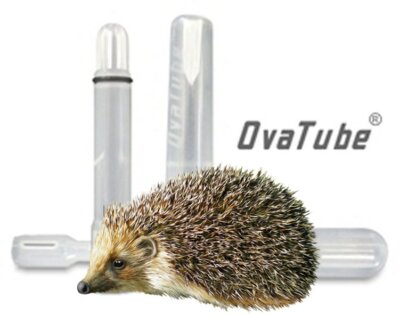
Statspin Ovatube®: Reliable DIY Parasitic Worm Egg Monitoring for Animal Keepers
Keepers and handlers of companion, recreational and rescue animals will find the Statspin Ovatube® Test is the quick, clean and convenient do-it-yourself method for detecting and monitoring intestinal worms and parasites.
With only basic laboratory space and an economically available veterinary microscope, Statspin Ovatube® provides a simple four-step DIY faecal parasite egg detection with no labour-intensive preparation, minimal sample handling and without the need for off-site processing.
Need For Reliable Parasite Egg Detection in Companion and Domestic Animal Faeces
Intestinal parasites can cause serious clinical problems in companion and domestic animals, including weight loss and diarrhoea, especially in young animals. In some animals, such as alpaca and llamas, intestinal parasites can even prove fatal underlining the importance of detecting intestinal parasites in young animals and those in close contact with others.
Detection and monitoring of intestinal parasites in domestic animals can be achieved indirectly by microscopic examination of their faeces for the presence of parasite worm eggs, known as ova or oocysts. However, most of the methods for parasite egg detection are difficult to perform, time consuming and require expensive veterinary laboratory equipment.
The Practical DIY Alternative to Traditional Intestinal Worm Egg Detection
The most used veterinary laboratory method for parasite egg detection is the McMaster Slide Technique. Despite being a veterinary standard, The McMaster test is limited to counting the number of eggs in a diluted sample of faeces. The uneven distribution of parasite worm eggs in animal faeces limits the accuracy of the McMaster test, making it suitable only for larger grazing animals such as cattle, sheep and horses.
For smaller companion animals, the Statspin Ovatube® is much more suitable requiring no dilution step prior to microscopic examination. This makes Ovatube not only more accurate, but faster and more practical for veterinary laboratories and for DIY parasite egg monitoring.
Statspin Ovatube® Makes DIY Parasite Egg Detection Clean, Quick and Cost effective
Statspin Ovatube® is the ideal all-in-one kit for veterinary practices and for owners and keepers of smaller animals such dogs, cats and even birds and reptiles. The Ovatube is also the technique of choice for monitoring intestinal parasite eggs in the faeces of rescue animals such as hedgehogs, and camelids including the increasingly popular llamas and alpacas.
Accurate, fast and reliable as an indirect method for detecting intestinal worm parasites, the only piece of necessary laboratory equipment is an economically priced microscope. All other consumable items and solutions are provided to ensure full detection of worm eggs without any messy, time-consuming preparation.
Ovatube: Quick, Clean Four-Step DIY Intestinal Parasite Worm Egg Detection
The Ovatube 4 stage technique simplifies oocyst egg detection into four key steps of sampling, mixing, filtering and separation with the easy to use three-part, single-use plastic ‘Ovatube’.
Ovatube Step 1: Faeces Sampling
Pushing the plastic sampling tool right into the centre of the faeces allows the removal of a measured sample without contaminating hands, clothes or other items.
Ovatube Step 2: Mixing the Faeces Sample With ‘Flotation Solution’
Placing it into the Ovatube, filled to the line with specially made ‘flotation solution’, then twisting and shaking the tool and faeces sample, causes the lighter parasite worm eggs to float, and the heavier faecal debris to sink out of suspension.
Ovatube Step 3: Filtering Out Larger Particles of Faecal Debris
Removing the larger particles of faecal debris is simply a matter of twisting the provided filter tool partway down the screw-thread conveniently pre-moulded into the inside of the Ovatube. This action forces the larger debris particles further toward the base of the tube.
Ovatube Step 4: Separation of Intestinal Worm Parasite Eggs
Simply allowing the Ovatube to stand vertically in the tube Rack for 5 to 10 minutes is all that’s necessary for any intestinal parasites, ova or oocysts to float right to the surface of the solution.
Alternatively, the Ovatube can be spun at low speed in a veterinary laboratory centrifuge in order to speed oocyst recovery. However, this requires a centrifuge specially adapted to hold 15ml tubes. In the experience of Vetlab’s experts, this centrifugation step entails significant extra cost and is not strictly necessary.
Finally, place a glass microscope cover-slip squarely over the top of the Ovatube, and screw the filter one more twist to bring the fluid in the tube into contact with the cover-slip. Transferring the cover-slip to a microscope slide is all that’s necessary to prepare any worm eggs for viewing under a veterinary laboratory microscope.
Praise For The Ovatube Parasite Egg Detection Method
Veterinary research sponsored at the Companion Animal Parasitology Council (CAPC) showed that Ovatube performed as well as, and in some cases better than, standard parasite egg detection. Easier and cleaner than the McMaster Technique, the CAPC report concluded that: “Ovatube offers a much simpler and cleaner procedure than the standard centrifugal method”.
Simple Parasite Egg Monitoring for At-Home Testing
Research published in Veterinary Technician showed that the Statspin Ovatube method needed no specialised equipment, making DIY parasite egg detection a practical at-home technique. Where other oocyte monitoring tests use a high-speed centrifuge to spin-out faecal debris, simply leaving the Ovatube to stand causes the heavier faecal matter to settle out.
The Veterinary Technician report concluded that: “In our study, we found no significant diagnostic difference between CF [centrifugation] and standing flotation,” and “… that centrifugation did not increase parasite egg and oocyst detection. Thus, centrifugation was not needed…”
Everything you and the animals in your care need for Statspin Ovatube parasite egg detection is available from Vetlab Supplies, specialists in veterinary laboratory supplies. Just click Vetlab F.E.C Kits & Equipment
For further information visit our website www.vetlabsupplies.co.uk or call 01798 874567

